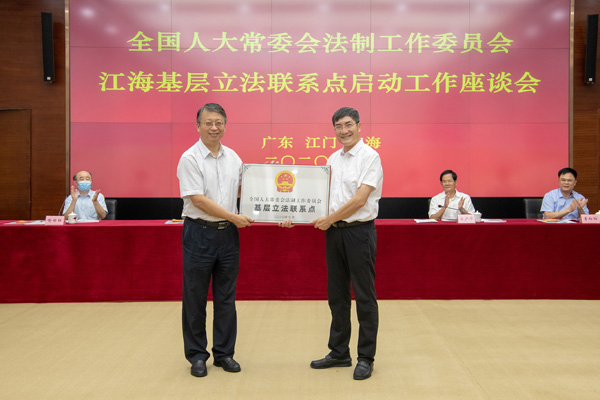Legislative input points for the public
Extensive engagement
In May and November 2015, the standing committee of the people's congress of Jianghai district, Jiangmen city, Guangdong province, became the LLOO for the standing committee of the Jiangmen city people's congress and the Standing Committee of the Guangdong Provincial People's Congress.
In July 2020, the Jianghai district people's congress standing committee was identified as an LLOO of the Legal Affairs Committee of the NPC Standing Committee.
Li Yanhua, a staff member at the contact point, told the media that at the beginning, the office of the standing committee of the Jianghai district people's congress was located in the government office building, "so residents had no idea where to express their opinions". When posting notices for soliciting opinions on the official WeChat account, there were only a few dozen views, with almost no replies.
Through practice, she found that people are more motivated to participate in laws that involve their own interests. Therefore, it is particularly important to first make a plan. It should determine the objects, scope, and methods of soliciting opinions based on the characteristics of draft laws and regulations or legislative projects.
When the standing committee of the Jianghai district people's congress solicited opinions on the Rural Collective Economic Organization Law (Draft), the discussion was heated. The farmers and village cadres who participated in the meeting "were about to start a quarrel".
This law will regulate the rural collective economy and involve the qualifications of shareholder members. One of the issues in focus is whether rural residents who do not live in rural areas can enjoy collective economic dividends.
Currently, Jianghai district's LLOO has completed a standardized legislative opinion collection process. As of February 2024, the "three-level" legislative contact point at the municipal, provincial and national levels has completed a total of 82 legislative opinion collection tasks and reported 1,875 opinions and suggestions. Of the 64 legislative items that have been reviewed and passed, 1,204 opinions and suggestions have been submitted.
The elite or the public?
Listen to scholars, or listen more to ordinary people?
After working at an LLOO for nearly three years, Liang Yingyan found that the NPC Standing Committee conducts differentiated consultations for lawmaking, based on the regional characteristics and resource endowment.
In recent years, Shanghai's Hongqiao subdistrict office was entrusted to launch consultation on the Value-added Tax Law, Financial Stability Law and Customs Tariff Law.
In her opinion, the reason why the consultations are focusing on the financial field is that "Shanghai is an international center".
At the end of 2023, the Hongqiao subdistrict was entrusted a new task, launching the consultation about the amended draft of the Frontier Health and Quarantine Law. Liang felt shocked initially, but the doubt soon vanished: there are many residential areas for foreigners in the subdistrict, as well as international schools, foreign enterprises and 21 consulates general in Shanghai.
"Quite a lot of people enter and exit China from Shanghai," Liang said.
The Jianghai district people's congress is designated as a national-level local legislative outreach office in July 2020. CHINA DAILY
As one of the first batch of LLOOs, the subdistrict felt pressure from the competition of its peers.
Compared with the legislative contact points at city level, a subdistrict has limited resources. Since 2022, the Hongqiao subdistrict office has strengthened its connection with 25 legislative contact points at city level to receive opinions from the public.
During the consultation, Liang noted that the residents are usually emotional when giving opinions and focus more on the actual result of the law. However, experts or legal workers in the subdistrict put more attention on the accuracy of words and whether the law can be implemented.
Who should the subdistrict office listen to, the public, or the experts or legal workers?
"It seems that the public has more weight," Liang said. In her opinion, the NPC Standing Committee will organize seminars with a large number of legal experts. At the grassroots level, public opinion is more important.
Across-the-board involvement
In some experts' opinion, an LLOO is the most important form of whole-process people's democracy.
Tan Huosheng, deputy director of the School of Social Sciences at Tsinghua University, wrote an article to explain whole-process people's democracy. In his opinion, the "wholeness" means all people are involved in the process of democracy. In addition, the channel for vulnerable groups and the marginal population to involve themselves in democracy should be available constitutionally and fundamentally.
Additionally, the "wholeness" also needs to be found in democratic elections, democratic decision-making, democratic management and democratic supervision at national, local and grassroots level, which cover legislation, administration and social life.
In Feng's opinion, the whole-process people's democracy is not only seen in the work of the NPC, but also manifested in the work of the government, judicial system and the people's political consultative conference.
"Society is more complex, which requires highly specialized skills," Feng said. He used to give suggestions to the work of the CPPCC.
The understanding and feeling were also found in this year's two sessions, which refers to the annual gatherings of the NPC and the CPPCC.
"I have a deep understanding of the whole-process people's democracy," said Liu Xiya, an NPC deputy from Chongqing, in an article published on her WeChat account on March 3.



 Print
Print Mail
Mail


